Abstract
Multiple burdens of malnutrition persist worldwide: 795 million people are hungry, more than 2 billion people suffer from micronutrient deficiencies and over 2 billion are overweight or obese. At the same time, various challenges continue to threaten global food security and nutrition. Smallholder farmers are a key to ending hunger and malnutrition worldwide, but they are increasingly facing barriers to profitability.
In Africa, the major challenges smallholder farmers encounter in their potential inclusion into food supply chains are low yields and access to markets. These challenges emerge from a lack of access to quality farm inputs and knowledge in farming practices. But even if the farmers have harvest surplus, their remote habitation limits their means of transportation and access to market price information make it difficult to access markets where they could sell their produce. The inclusion of digitalization of agriculture in Africa as a strategy to help tackle food insecurity in Africa, could boost productivity, profitability and resilience to climate change.
This 4Revs case states how a Farmerline venture registered in Ghana connects farmers to markets, finance, weather forecast, new farming tips, inputs dealers and equipment services.
To address this problem above, the Ghanaian venture Farmerline with the use of software Mergdata, reaches farmers via mobile technology that is adapted to the local context and shares empowering information in mass quantities in voice SMS format. It currently serves farmers in Cameroon, Malawi, Nigeria and Sierra Leone.
Main Highlights
The Problem: Smallholder farmers lack access to quality inputs, storage facilities, finances and agricultural services. Unavailability of platforms that connect smallholder farmers to the global market.
The Context: Farmerline’s software MERGDATA reaches farmers via mobile technology that is adapted to the local context and shares empowering information in mass quantities in voice or SMS format. Business activities include licensing the software, surveying tools and database to organizations (B2B) as well as direct sales of content services to farmers (B2F), and have resulted in USD 300,000 of revenues in the past year.
The Solution: Digitalization of smallholder farmers for food sustainability. Farmerline provides paid services that allow farmers to have the information and access they need to employ an entrepreneurial method of farming. Input dealers and traders pay for more efficient communication channels to farmers and farmers pay for information packages and services.
Impact Statement: Digitalization connects smallholder farmers to the global market, farmerline has reached over 200,000 smallholder farmers across 5 countries in 3 years creating a meaningful social and environmental impact.
Systems Perspective: The benefits of agricultural digitalization will need the government to help drive private sector investment in areas as diverse as production, postharvest handling, market access, finance and supply chain management.
Case Overview
The Problem
According to the Food and Agriculture Organization of the United Nations, the world population will reach 9.1 billion by 2050, and to feed that number of people, global food production will need to grow by 70%. For Africa, which is projected to be home to about 2 billion people by then, farm productivity must accelerate at a faster rate than the global average to avoid continued mass hunger.
There are about 475 million smallholder farms worldwide. They are in sub-Saharan Africa, South Asia, Europe and some in the United States. About two-thirds of all farms in Europe are smallholder. Despite smallholder farms being higher yielding, poverty is still rampant among farmers and their households. They often cannot afford basic needs and Investing or reinvesting in equipment is often difficult. Smallholders are faced with other problems like poor infrastructure such as roads to reach markets. They often don’t have proper storage facilities, limited access to financing and global markets. Smallholder Farmers also have limited access to agricultural services. Getting a consultation from extension, or quality inputs especially seeds, fertilizers and equipment is difficult.
The vast amount of output produced by smallholders are wasted due to unavailability of platforms to connect farmers to global markets thus leading to food and nutrition insecurity and unsustainability.
Context:
Investing in the future of farming has become easier than ever with the introduction of digital tools and online networks. In fact, as technological expansion continues in Africa, countries are beginning to farm in a whole new way. In the Sub-Sarahan nation of Ghana, agriculture is the most crucial sector of the economy. The farming sector alone employs more than half of the current population of 30 million. Moreover, it accounts for 50% of all export profits and the Gross Domestic Product (GDP). Finding methods to make the farming industry in Ghana more efficient and productive are crucial steps forward. Fortunately, two innovators founded a company to bring the farming industry into the technological world and aid farmers — Farmerline.
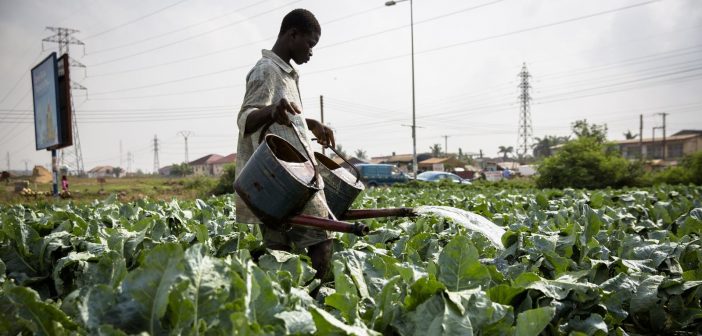
Solution:
An inclusive, digitally-enabled agricultural transformation could help achieve meaningful livelihood improvements for Africa’s smallholder farmers and pastoralists. It could drive greater engagement in agriculture from women and youth and create employment opportunities along the value chain.
Over 33 million smallholder farmers and pastoralists have already been registered with digital solutions across Africa, and the sector is developing rapidly-with a growth rate of around 45 percent per year since 2012.
Farmerline’s aim is to improve the livelihood of farmers in rural areas in Africa via digitalization.
Farmerline, in partnership with MergData, is a social software company based in Ghana. The company uses various digital communication methods to connect farmers to essential business services and partnerships. Services from Farmerline include: Mobile messaging, Weather reports from 80 varying stations throughout the country, Pest and disease projections, Market information and Financial services.
Information received from financial institutions, governments, weather stations and development organizations are processed into Mergdata. Farmerline uses voice messages recorded in local languages to inform and keep farmers up to date with information tailored to individual needs. The software offers a marketplace function; allowing farmers to buy virtually everything they need for their work: fertilizer, seeds, pesticides and water pumps. It also educates farmers on standards, certification inspections and guidelines relating to child labor, nature protection and climate change.
Farmeline have reached 200,000 farmers and profiled 700,000 acres of farmland. It is currently in thirteen African countries, including Ghana, Sierra Leone, Uganda, Cameroon, Nigeria and Malawi with over 200 field agents, who are locally trained.
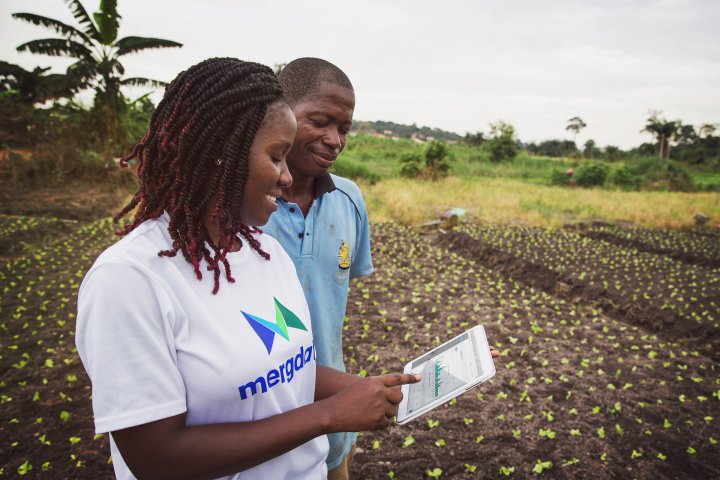

Impact Statement
Beyond the digital side of Farmerline, there is the human aspect. In conjunction with technology, Farmerline utilizes field agents to educate and provide thorough training to more than 12,000 farmers. To continue its work, Farmerline has adapted to socially distant methods of training. Field officers have primarily been coaching and educating via phone calls and the Farmerline call center.
The world population will reach 9.1 billion by 2050, and to feed that number of people, global food production will need to grow by 70%. These challenges of global demand for food could only be solved if smallholder farmers have access to a platform that enables them to connect to the global market. In this regard, digitalization of smallholder farmers is a game-changer and also offers viable business opportunities in Africa and globally.
By comparison with past revolutions in agriculture, digitization of smallholder farmers has emerged as a way to fully incorporate more smallholder farmers into the food supply chain.
Digital agriculture offers vast number of benefits for smallholder farmers;
- Enables farmers keep records of their transactions
- Access to market and weather information.
- Provides information on improved farming practices
- Financial services (loans/savings)
- Provide access to quality and affordable farm inputs
- Connects farmers to global market
The global digital agriculture market is expected to grow at a compound annual growth rate of 10.26% over the forecast period to reach a market size of US$20.713 billion in 2025 from US$11.527 billion in 2019. Digitalization of agriculture is allowing participation of stakeholders such as farmers, researchers, and others that are working within the agriculture system or a value, to enhance their crops and food production.
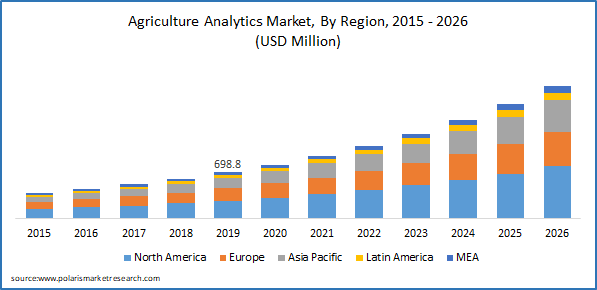
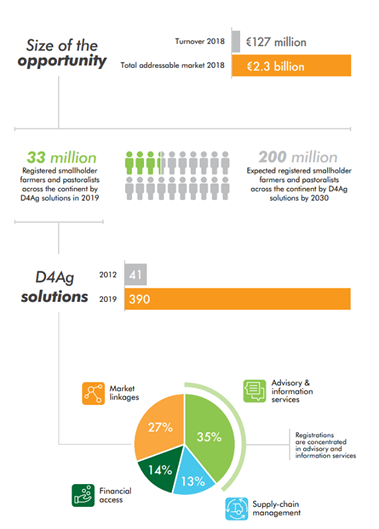
Systems Perspective
Digitization of smallholder farmers is a game – changer. It is a crucial area the 4Revs companies (within the agricultural industry) should look into for food sustainability especially in Africa.
Africa’s demand for food is growing. Between 20210 and 2030, the total worth of its food industry is projected to hit the $1 trillion mark. While seeding technologies like improved seeds and fertilizers will be critical to meeting this demand, Africa’s farmers will need additional new tools to improve yields and get their goods to market. Digitalization can deliver these tools.
Across the continent, we know farmers are already applying these digital technologies to learn new skills, receive and deliver services, and connect themselves to widely dispersed geographical areas.
There is great hope that this can drive Africa’ agricultural transformation and do so at a lower cost and sooner.
One area that has recorded unprecedented growth is in mobile telephony. In 2017, the number of mobile phone connections on the continents was around 747 million, representing a 75% penetration rate, compared to 102% in Asia –pacific and 104% in Latin America.
Efforts to improve digital access are already having an effect, with the price for mobile internet in Africa dropping by 30% since 2015. Encouragingly, even smallholder farmers in rural areas across the continent are getting connected. This can only be welcome news as it has been shown that each 10% rise in internet penetration can lead to a 1.35% rise in GDP growth in developing countries.
Improving access to mobile phones could have huge effects in terms of empowering women farmers. In 2017, sub-Saharan Africa women were 14% less likely to own a mobile phone than men and 25% less likely to have internet access.
It is estimated that leveling this gap could improve agricultural production by up to 4% decreasing the number of Africa’s hungry people by up to 17%.
The benefits of agricultural digitalization will need the government to help drive private sector investment in areas as diverse as production, postharvest handling, market access, finance and supply chain management.
Digital era offers many new innovations and breakthroughs- seemingly every year-that will allow African continent to get ahead of the curve, and more efficiently and sustainably unlock the full potential of its smallholder farmers and agribusiness sector.
Farmerline is helping to create a digitized platform for smallholder farmers in Ghana and other African countries by providing necessary resources they need to increase productivity and profit.
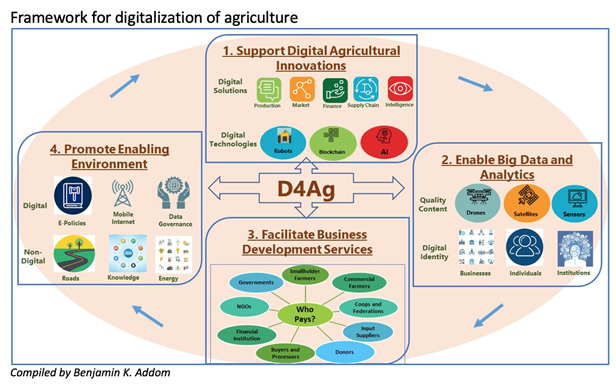
Links and Contact Information
- https://businesspartnershipfacility.be/farmerline-story/
- https://www.un.org/africarenewal/web-features/africa-leapfrogging-digital-agriclture
- https://hbr.org/2017/05/how-digital-technology-is-changing-farming-in -africa
- https://www.researchgate.net/publication/345310317_The_Enabling_Environments_for_the_Digitalization_of_African_Agriculture
- https://cgspace.cgiar.org/bitstream/handle/10568/103198/Executive%20Summary%20V4.5%20ONLINE.pdf
- https://www.ifpri.org/blog/making-digitalization-work-african-agriculture-role-enabling-environment
Company Website: https://farmerline.co/
LinkedIn Profile of C.E.O Alloysius Attah: https://www.linkedin.com/in/alloysiusattah
LinkedIn Profile of Farmerline: https://www.linkedin.com/mwlite/company/farmerline
Facebook: Farmerline (facebook.com)
Twitter: https://twitter.com/farmerline
Email: team@farmerline.co
Tel: +233559705112
KUMASI, GHANA OFFICE
10 Prof Sir Acheampong Street
Plot 29 Block L Old Ahinsan, Kumasi
Ghana
Article by: Abiodun Bolanle Demehin and Felix Iziomoh, 4REVS researchers (and more)

